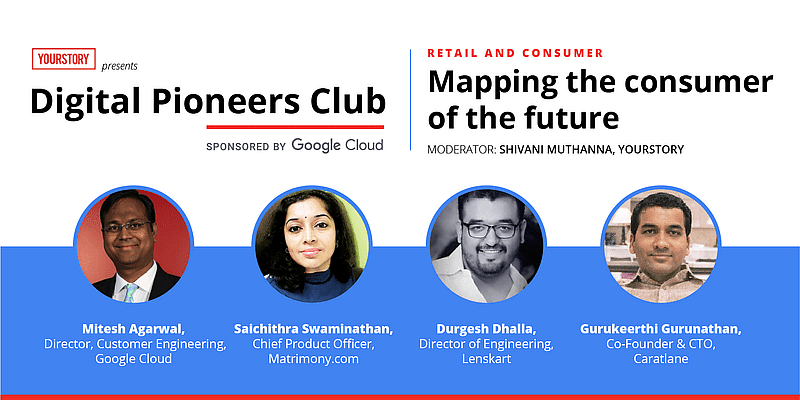Old habits die hard but consumer behaviour proves otherwise. The COVID-19 pandemic, lockdowns and social distancing mandates have disrupted the consumer habits of buying and shopping. According to a Mckinsey survey, 75 percent of consumers who were making purchases online for the first time will continue to do so even after normalcy is restored.
In such a scenario, long-term growth for consumer-facing organisations rests on providing a superior experience across the entire consumer journey and varied channels. In the latest edition of the Digital Pioneers Club CTO Roundtable series, hosted in association with Google Cloud, leading consumer-facing organisations discussed the key shifts in consumer behaviour and priorities, its impact on businesses, the role of analytics in driving business growth, and more.
The roundtable featured Saichithra Swaminathan, CPO, Matrimony; Durgesh Dhalla, Director Engineering, Lenskart; Gurukeerthi Gurunathan, Co-Founder, SVP Technology – CaratLane; and Mitesh Agarwal, Director of Customer Engineering & CTO, Google Cloud India. Here are some of the key takeaways from the session.
Safety key priority for today’s consumer
Significant traction has been observed on their online channels in the past year, the panellists noted, and that the need for safety prompted this trend. “During the pandemic, all of us saw a good increase in signups (on the Matrimony platform). There was an increased adoption on online platforms, and a greater inclination towards video, as compared to in-person meetings. There was also an acceleration of digital payments,” said Matrimony’s Saichithra.
Given that safety was a top priority among consumers, CaratLane’s Gurukeerthi said they looked for new ways to improve their omnichannel retail experience. “And while fewer parties and in-person celebrations took place, people wanted to celebrate milestones. We rolled out Caratlane Live, where customers can interact with the salespersons virtually and check out the products,” he said.
Google Cloud’s Mitesh noted that this change in consumer priorities has forced businesses to rethink their technology solutions. “As we are seeing a shift in the what, who, where and even how of consumption, there has been a need to target specific audiences, or find new ones. And given that people are prepared for uncertainty all the time, there has been a need for new marketing insights and a new dynamism in the way businesses configure their systems,” he shared.
Mitesh added that much can be done with technology solutions to improve the customer experience, both online and offline. He also noted that to this end, businesses are prioritising data-driven automation, privacy and security.
Data-driven approach for improving consumer experience
Lenskart’s Durgesh explained that while inventory management and fulfilment form the backbone for providing a superior consumer experience, it is also a big challenge from an omnichannel perspective. “To solve this, we need to have a centralised system that connects with cloud services to get the real-time inventory updates across Lenskart’s 700 stores and various manufacturing units. We also have an inhouse solution that can scan barcodes, and helps maintain inventory accuracy of 99.5 percent,” he said, adding that by leveraging artificial intelligence and machine learning (AI/ML), popular inventory is suggested to stores for better customer services.
Gurukeerthi also elaborated on how Caratlane’s robust analytics stack is central to driving value across the entire consumer journey. “All our consumer actions are driven by data — right from consumer targeting to the customisation of the product portfolio and ensuring a smooth post-conversion process,” he said, adding that leveraging a lot of cloud solutions out-of-the-box has been a crucial part of creating a robust data analytics infrastructure.
Recounting the five factors driving traffic to any digital property in the consumer space, Mitesh said, “The first is the recommendation AI, which is a core part of the online experience for any consumer. It is also necessary to ensure excellence in providing an omnichannel retail experience as it is crucial for sales. Infrastructure and content drive consumer loyalty. Finally, it is also important to provide a consistent and frictionless experience to consumers.” He further explained how Google Cloud can play a significant role in using data to create highly personalised consumer experiences in a secure fashion.
Data transparency to facilitate business excellence
Given the interconnected nature of multiple business functions, Sai explained the need to ensure complete transparency of data across these functions to ensure the long-term growth of businesses. She recounted how the company’s product, business development, customer service, and marketing verticals are able to gain crucial insights by accessing data through a common data layer that has been developed internally, which in turn has helped the entire business to grow together.
The roundtable concluded with Mitesh outlining how a robust API and data strategy, the modernisation of a stack, are the key pillars for a successful consumer-facing business. “You cannot meet the requirements for speed, scale and adaptability if you don’t have flexible architecture. And while everyone seems to have an ML agenda, it should not be the central focus. Finding use-cases for your business and then applying ML would go a long way in driving impact,” he said. He also spoke about the importance of providing recommendations through AI, demand forecasting, and how Google Cloud’s Apigee can help streamline monetisation through APIs and how Appshield can help with no-code deployment.








![Read more about the article [Funding alert] Enterprise logistics startup COGOS raises $2M in pre-Series A round](https://blog.digitalsevaa.com/wp-content/uploads/2021/09/Image5wy1-1630828923435-300x150.jpg)
